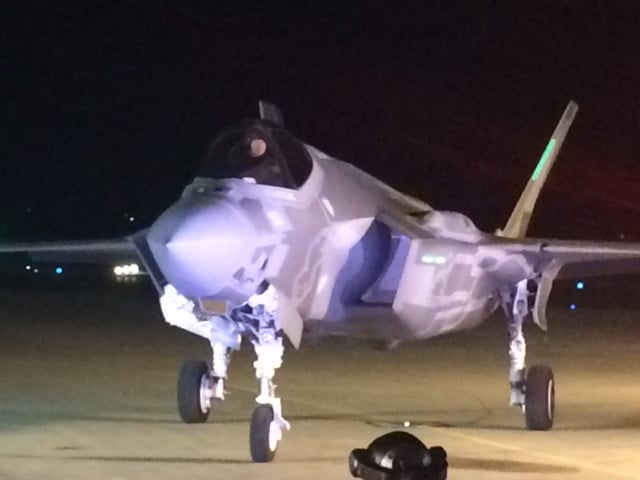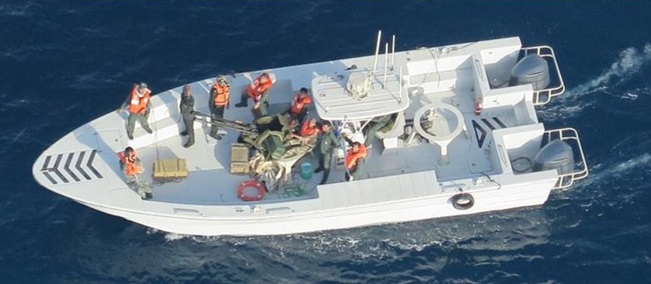Iran: Israeli F-35s Rehearse Strikes As US Sends Troops — But Will Europe Flinch?
Posted on

First Israeli F-35s land at Nevatim Air Base.
TEL AVIV: As Iranian proxies escalate their attacks and the US sends another thousand reinforcements to the Middle East, the Israeli Air Force is conducting a massive wargame. Most notable: For the first time, the Israeli’s new F-35 stealth fighters are participating in an exercise simulating strikes against advanced Russian-made air defenses.
That includes the S-300 system of radars, missiles, and command posts recently acquired by both Syria and Iran, as well as the still more sophisticated S-400 Triumf that Russia has refused to sell to Iran, so far. (Turkey, a NATO member and informal ally of Israel, is buying the S-400, endangering its ties with the US).

The mobile radar for the S-300 air defense system.
“We are preparing the Air Force for the arrival of the S-300 and S-400 missiles,” an IAF spokesperson said. Israeli sources warn the Russians may rush the S-400 to its Mideast allies “under certain circumstances,” so pilots must be trained to penetrate it now.
The Russian-designed defenses protect Hezbollah and Iranian rocket and missile launchers that threaten Israeli territory. “Our mission is to strike before even a single rocket is launched,” an IAF colonel said. Combat squadrons, transport aircraft, helicopters, air defense units, and ground forces all participated in the exercise.
Meanwhile, on June 18th, rockets struck near US-linked targets in the northern Iraqi city of Mosul and the southern city of Basra. No casualties were reported in Mosul, where a military base was hit when US personnel were reportedly present. But the attack on foreign oil companies outside Basra wounded three people and caused Exxon Mobile to evacuate 21 of its personnel to Dubai. Iranian-backed Shia militias are suspected.
Israeli experts fear that the Iranian attacks aim to drive a wedge between the US and Europe. The allies were already at odds over President Trump’s withdrawal from the Obama-era JCPOA pact, on which European leaders had staked their hopes of containing the Iranian nuclear program. Now the US and Europe seem unable to agree on a response to Iranian provocations. At this point, sources said, the Iranians are trying to buy time to enrich uranium while undermining international sanctions over their nuclear program.
How? “The Iranians think that these attacks on different targets will ease the sanctions,” retired Maj. Gen. Amos Gilead told Breaking Defense today. Gilead served 30 years in the IDF and held such prominent positions as head of the Military Intelligence Research Division. By using their proxies and special forces to stir up tensions in the Gulf, Iran hopes to panic European and Asian nations dependent on Gulf oil to pressure the US into backing off.
The trick is to escalate without directly attacking the US, Gilead said: “They want to avoid a full-scale war.”

An image released by the Pentagon purports to show an Iranian boat near damaged oil tankers.
The Iranian Strategy
Iran has a clear plan to get nuclear weapons without provoking open war, the well-informed former head of Israeli military intelligence, retired Maj. Gen. Aharon Ze’evi-Farkash, told Breaking Defense in an interview. Iran signed the Joint Comprehensive Plan Of Action during a dire economic crisis aggravated by US-led sanctions, he said, and “[while] no one believed that they were going to fulfill the deal word-by-word, until some six weeks ago, the Iranians more or less stuck to the general terms.” On Monday, however, Tehran announced it was now enriching uranium at such a pace that it would exceed the JCPOA limit within 10 days.
“When President Trump declared that the US is not part of the deal anymore, the Iranians began to use the rift between the U.S and Europe for their interests,” Farkash continued. “While the US continued to apply heavy pressure, the Iranians….began using their proxies for military actions.”
Iranian leaders know that if they directly and openly attack US targets they will provoke a violent American response, perhaps strong enough to threaten their regime’s control over their own country.
But what if the US responds to proxies with proxies of its own? If President Trump decides not to act directly but rather give Israel a green light to strike Iran, Farkash said, that puts Tel Aviv in a dangerous position.
“Netanyahu has declared again and again that Israel will not allow Iran to gain military nuclear capability,” Farkash said, “but he knows that even an attack on some major nuclear facilities in Iran will only slow the Iranian program. I personally hopes that Israel will not act alone against Iran. This is an international problem.”
Israeli sources told Breaking Defense they hoped that, if the US decided to act, it would launch its own extensive airstrikes against at least one key Iranian nuclear facility. (They didn’t specify which). Such a strike, however, would provoke Iranian retaliation not just in the Middle East but around the world, potentially including terrorist attacks in the United States.
Subscribe to our newsletter
Promotions, new products and sales. Directly to your inbox.
